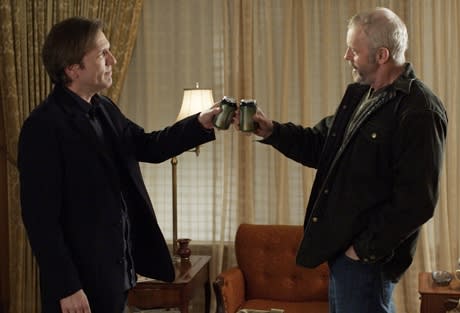Politics, celebrity and failure: in essence, these are the themes that define and propel veteran actor Martin Donovan's directorial debut, Collaborator. They're also themes prevalent in the works of Hal Hartley, with whom Donovan started his career, acting in his early indie features. A similar aesthetic and darkly comic tone — one that wears its brain on its sleeve — between the two suggest influence and, yes, "collaboration." But Collaborator is, in its own way, a slightly less witty and moderately more accessible take on the indie art-house conversation drama, adding a thriller element to the proceedings when failing writer Robert Longfellow (Donovan) winds up being held hostage by his childhood neighbour, Gus (David Morse), after returning home to visit his mom (Katherine Helmond). Before this happens, Robert is developed as an urban liberal stereotype, working as a playwright in NYC, when shitty reviews leave him on the doorstep of an actress (Olivia Williams) he helped make famous (when not sleeping together), looking to collaborate on an adaptation of a novel with a strong female protagonist. This set-up and precursor to the hostage situation ultimately have a point and purpose to the story, developing the very moral and sanctimonious artiste as a bit of a hypocrite, cheating on his doting wife (Melissa Auf der Maur), when not quietly fishing for superficial compliments from dilettantes and sycophants. Our protagonist, while self-righteous, has flaws just like his less educated, alcoholic, hardcore nationalist high school acquaintance, Gus. Initially, their conversations play for comedy, with Robert quietly patronizing the limited vocabulary and uncouth sensibilities of a man waxing nostalgic. But once Gus shows part of his hand, pulling out a gun after he convinces the uptight playwright to smoke a little weed, the power dynamics shift and the Conservative cliché demonstrates far more intelligence and perception than initially presumed. Why this all turns into a hostage situation and why there's so much build-up in secondary storylines remain a mystery until the climax. What works about Collaborator is the occasionally witty writing and invested performances from Donovan and Morse. It's not quite as clever as it thinks it is, even though the hints at art as a mode of exploiting human tragedy hold more intensity than the narrative allows, but it's still a refreshing style and approach to filmmaking (a throwback, if you will) amidst a sea of superficiality. Only a couple of interviews are included with the DVD, making this a mostly bare bones release.
(eOne)Collaborator
Martin Donovan

BY Robert BellPublished Mar 7, 2013